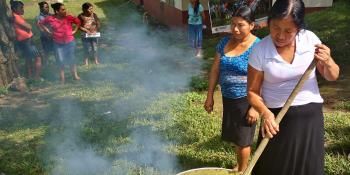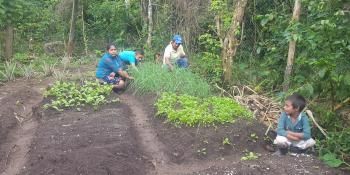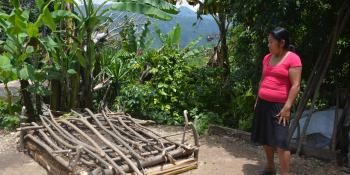Managing climate at local level
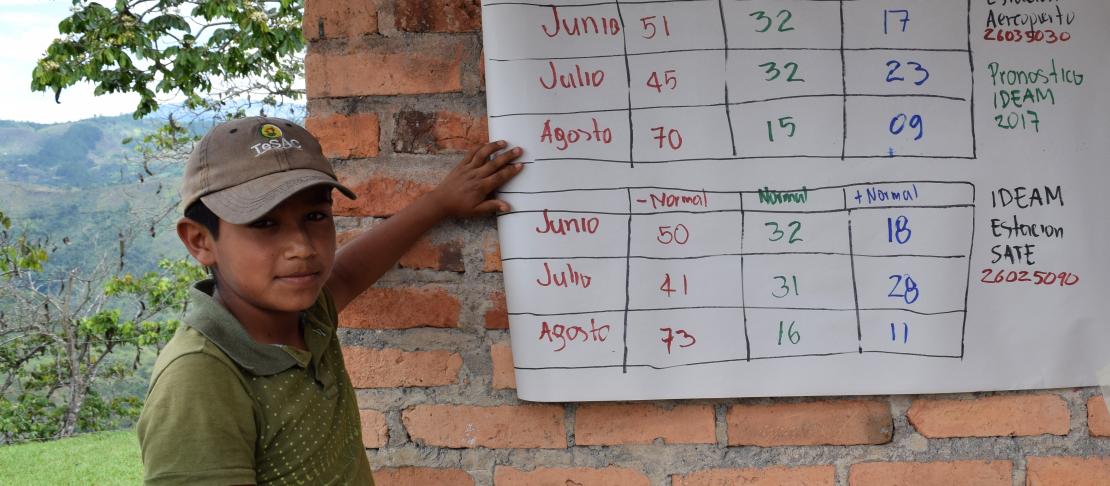
A community process supported by the Institute for Hydrology, Meteorology and Environmental Studies.
Implementing the Climate-Smart Village (CSV) process, ran by the CGIAR Research Program on Climate Change, Agriculture and Food Security (CCAFS), the International Center for Tropical Agriculture (CIAT) and ECOHABITATS Foundation in the rural communities in the north-west of Popayan, Cauca Department, has enabled the Institute for Hydrology, Meteorology and Environmental Studies (IDEAM) to join local communities and regional institutions as a key actor in the “Managing climate at local level” mission.
The initiative, which is currently being turned into a national pilot project actively involving IDEAM, aims to help rural families understand climate variability on their farm and its connection with climate change, which often negatively affects their livelihoods; at the same time, in some cases this can represent potential opportunities, as it’s the case of climate-smart agriculture (CSA).
The main reason why climate variability negatively influences producers’ crops every year is that they still expect rainy and dry seasons – to plant and harvest, respectively – to behave “normally”, as in past decades.
Climate variability brings with it increasingly irregular, intense climate phenomena, triggering ever-bigger impacts. Understanding its behavior and how it factors in rural families’ activities is the best adaptation method to climate variability and change.
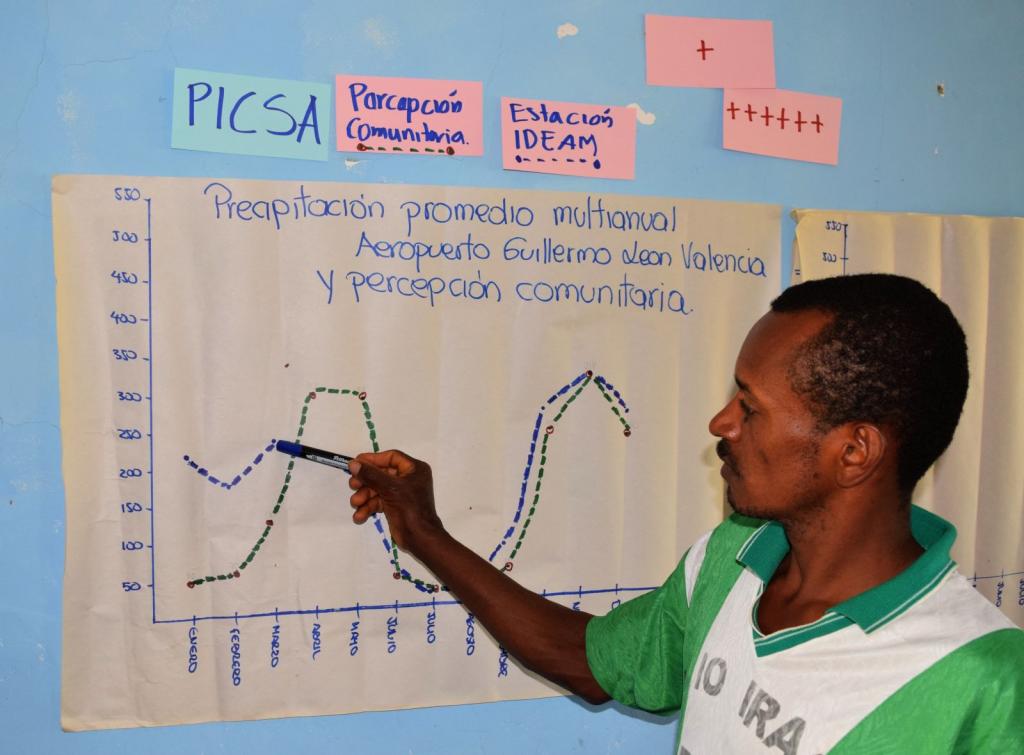
Local historical climate information and farmers' perception using the PICSA methodology. Photo: Luis A Ortega (ECOHABITATS Foundation)
To that end, the CSV process begins with the participatory elaboration of Farm Adaptation Plans, through which rural families identify what they are vulnerable to, how much and when. Having that vulnerability analysis helps families define the appropriate adaptation measures to reduce negative impacts of main weather events as droughts, storms and high winds, while taking into consideration implementation costs and maintenance in a certain time horizon.
Using this local adaptation planning process as a basis, IDEAM has joined the implementation this participative tool to generate Participatory Integrated Climate Services for Agriculture (PICSA), developed by the Walker Institute at the University of Reading, together with CCAFS. With this connection that goes from local to national level and uses the PICSA tool, local producers have the capacity to generate adaptation plans for their properties and make informed decisions regarding the reduction of agro-climatic risks, as they can understand climate information specific for their territories.
To support this process, IDEAM’s Meteorology Department strengthens the CIAT, CCAFS and ECOHABITATS research team by providing local weather predictions, which make up the base for understanding climate at community level.
The process begins with communities analyzing and understanding historical values for temperature and rainfall in the territory (exposure) by using climate information from weather stations closest to the CSV. Afterwards, properties are mapped to identify which events cause the biggest damages on each property component (sensitivity) using perception scales. Finally, adaptation methods to manage those impacts are identified (adaptive capacity). The process ends with identifying vulnerability levels for every property, including exposure, sensitivity and adaptive capacity.
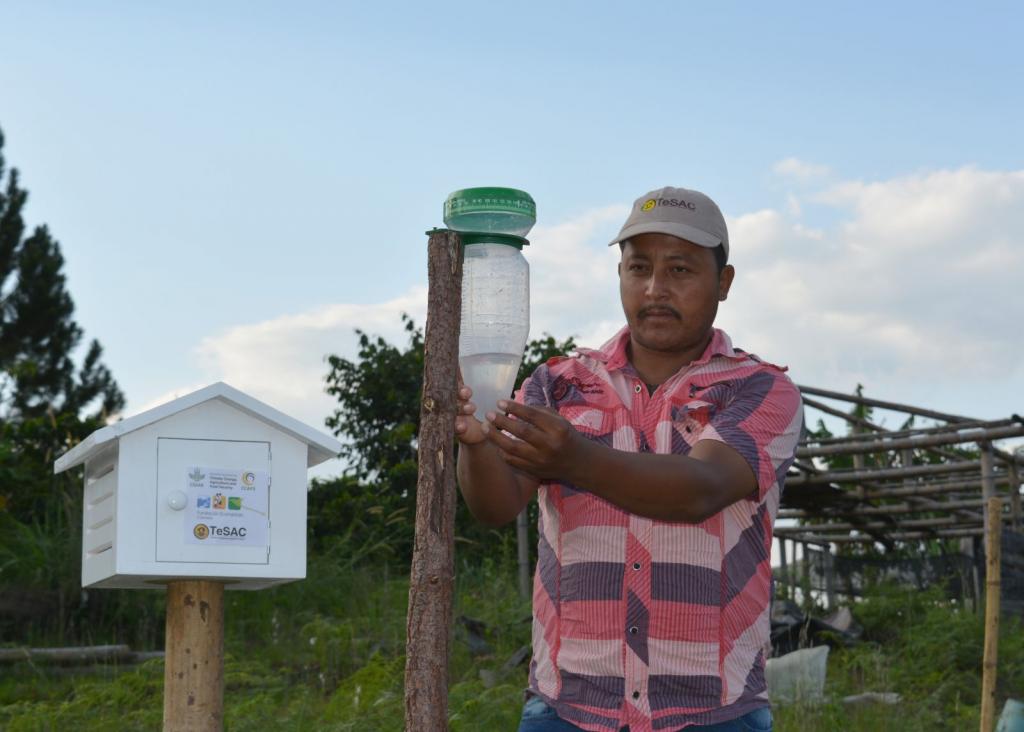
Local farmers are using meteorological tools to understand predictions. Photo: Luis A. Ortega (ECOHABITATS Foundation)
With that information available, adaptation methods are then prioritized based on the results of the vulnerability to climate variability analysis for each property, micro-farm and community, using information provided by the IDEAM-CIAT-CCAFS-ECOHABITATS team. Together with the community, they analyze climate and historical climate information perception, as well as the climate prediction probabilities for upcoming months and weather reports for the next days using graphics. They also identify the appropriate climate-smart agriculture adaptation methods (practical or technological) for the given predictions – crop and livestock management, efficient use of water resources, improved varieties, soil and fertilizers’ management and conservation, etc.
As a result, IDEAM has got much closer to local realities.
Until recently, IDEAM was for us farmers a governmental institution that did not reach our territory. But throughout the CSV process, we realised it is the main ally of producers, men and women. Without their research done here for many years, climate would have majorly affected our properties. Having the forecasts and local information IDEAM provides and making progress on adaptation with ECOHABITATS-CCAFS and CIAT, we can say IDEAM is our main partner when it comes to deciding how to manage the climate at village level.” Mrs. Waldina Bermúdez, farmer in Santa Rosa CSV in Popayán
Farmers have a network of weather stations at community level - pluviometers, thermometers and tensiometers – pH (which measure soil humidity and pH) strategically distributed in the territory – and the information is used on the short-term to make decisions regarding crops, water resources for irrigation and domestic use. Planning involves participatory research processes, appropriation, generation and use of local climate information, as well as reducing climate prediction uncertainty.
For an overview of these actions, Cauca’s Agroclimatic Technical Committee met on October 18, 2017, together with IDEAM, the Cauca Regional Autonomous Corporation, CCAFS, CIAT, the ECOHABITATS Foundation, the Cauca Government, Rio Las Piedras Foundation, Cauca University, the Food and Agriculture Organization (FAO) and the Ministry for Agriculture and Rural Development (MADR). Both men and women producers from the community, who are heavily involved in the CSV process and are “empowered to understand the climate” also participated, as they play an increasing role in generating agro-climatic bulletins.
Luis A Ortega is the director for protected areas and climate change at ECOHABITATS Foundation. Liliana Paz is a founding partner at ECOHABITATS. Deissy Martinez Baron is the science officer for CCAFS Latin America.

